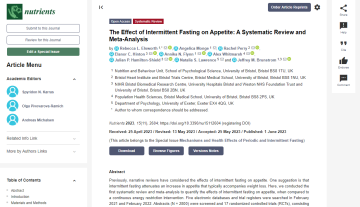Long-term effects of fasting on healthy weight maintenance
Theme Diet and physical activity
Workstream Clinical diet and physical activity
Status: This project is ongoing
This project will explore the effects of intermittent fasting on appetite and eating behaviour. Intermittent fasting is when a person alternates between dieting and eating normally. A systematic review and meta-analysis will assess the effects of intermittent fasting on appetite and compare this with the effects normal dieting has on appetite. Knowing this will allow us to investigate what effects fasting has, beyond calorie restriction alone.
During this project we have been developing an ecological momentary assessment (EMA) tool. Our EMA approach combines automated text messaging with an online platform to measure dynamic changes in a person’s appetite, their current ideal portion size, and their capacity to restrict their food intake. In future, we think this tool could be used in a wider context to understand how weight-loss interventions impact appetite in everyday life and over long periods. Currently, we are using this tool to:
- Explore the effects of a single fast on appetite – participants will attempt a single day of fasting and take part in EMA before, during and after this fast
- Investigate everyday fluctuations in appetite in individuals who already intermittent fast compared to individuals who have never intermittent fasted
Our work so far
We reviewed data from 17 clinical trials comparing intermittent fasting and continuous energy restriction interventions. Looking at this data allowed us to explore the potential effects of both interventions on appetite. The term appetite relates to a person’s desire to eat, as well as how full or hungry they feel.
We found no clear evidence to suggest that intermittent fasting had a different effect to continuous energy restriction, on appetite. This finding is not in line with existing narrative reviews, which have suggested that intermittent fasting may be beneficial for attenuating the increase in our drive to eat that can accompany weight loss.
However, many of the studies we looked at only measured appetite once per day, which was often before breakfast. This means that they could not explore how these diets affect changes in appetite throughout the day. We hope that our continuing EMA work will enable us to better understand how intermittent fasting affects appetite and eating behaviour.
This research is part of a PhD project being carried out by Becca Elsworth with supervision provided by Dr Ella Hinton, Professor Jeff Brunstrom and Professor Julian Hamilton-Shield.
